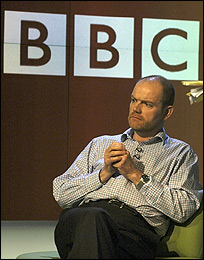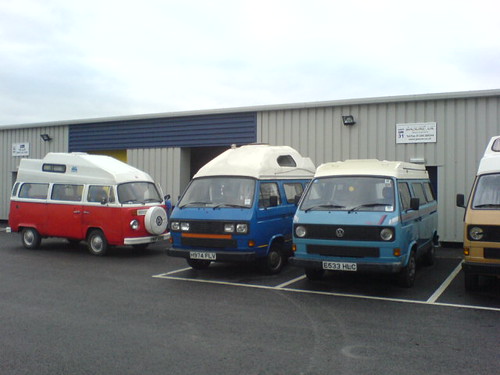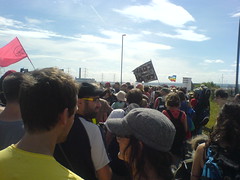Plastic is a wonderful substance. I can’t imagine a single other material that is so utterly versatile. The computer that I’m typing on, the kettle in which I’ve just boiled the water for my tea, even my ethically-sourced (vegetarian) shoes would be very much different without plastic.
What a shame therefore that we seem to make such a trivial use of an important substance as plastic bags.
Plastic is of course one of the smallest constituent products of the average barrel of oil, with apparently just 4% of crude oil consumption used for all plastics, and only 2% for all films, of which plastic bags is a very small proportion. 85% of oil is burned as fuel or heating.
And as a colleague of my father’s (a chartered chemist) once said “trust human beings to discover the single most useful substance in the world…. and then burn it.”
So, I guess that from a green point of view, making plastics is a relatively good use of a precious (and polluting) substance such as oil. All the more of a missed opportunity then to make such flimsy, disposable and ephemeral products with it.

The British Federation of Plastics sells the concept of “placcies” to us by asserting that plastic bags are a “useful, hygienic, odourless, waterproof, robust and convenient way of carrying goods”.
I’ve got no problem with that; if I’d owned one plastic bag in my whole life I doubt I could be criticised by even the most ardent deep green. The problem seems to be throwing the bags away, and them being made to be thrown away, necessitating UK consumers being given 13 billion plastic bags a year.
I myself am not remotely immune to the owning, wrecking and throwing away of plastic bags (and even though there is evidence that a large majority of people re-use the plastic bags they collect, let’s face it, they all get thrown away in the end). My local food shop has had what I’ve thought was a good policy of not giving out plastic bags, but instead having a big box of plastic bags available that other customers have brought in to be re-used.
But recently, on a couple of visits the stash of free second-hand bags has – shock horror – been exhausted, and I was even once obliged to buy a durable cotton bag instead, paying several pounds in the process(!). The emotions of guiltiness, having been caught-out in my plastic-bag-(re)using ways, and being forced to repent (and pay the price of a small cotton bag) were enough to make me question my whole approach to plastic bags, and to take reusable bags more seriously.
And since I’ve taken to riding home on my bike with shopping bags on the handlebars, I decided I could do with some more robust shopping-carrying technology.
So, I took the bold step of splashing out on a £2.99 extravaganza from Oxfam, on a bag that is sturdy enough to stand up to being slapped repeatedly against my bike frame on the way home.
 I remember slightly resenting the “high” price of my latest acquisition, but feeling pleased with my “expensive” bag. It’s not going to wear out any time in the next 5 years. Or 10 probably.
I remember slightly resenting the “high” price of my latest acquisition, but feeling pleased with my “expensive” bag. It’s not going to wear out any time in the next 5 years. Or 10 probably.
It’s made of the same material they make sacks from. It has an austere, ascetic look. I like that though. It makes me feel just a little bit rough around the edges, just a little dangerous and radical. Strutting around town with my suit, and my brown, mean, canvas bag.
It does however have a thin layer of plastic on the inside to waterproof it. Surely all the plastic a bag needs…?
Also, in contrast to the anonymous and unrespected provenance of plastic bags, this bag has a character, and a history: it was handmade in Bangladesh, and is Fair Trade; a woman – Nazma of Action Bag – pictured on the label says “I was almost broken, I had nothing to do and was almost starving. Now I can pay the rent and maintain my livelihood.”
So already I feel like I’m getting a higher quality bag for my bucks.
Next post: the soup of plastic, bigger than the continental United States, that is floating across the Pacific. Oh, and my search for a manbag
 Email This Post
Email This Post
 Email This Post
Email This Post





 President Barack Obama’s inauguration speech has much in it for British Greens to be happy about. Not only does it frame climate change, peace and global co-operation as urgent issues for “a new age”, it contains relatively little that is otherwise offputting. Most of all, it provides a sterling example of the kind of speeches that WE as Greens could and should be making, complete with a range of “reframed” strong takes on the climate crisis, and a clear underlying emotional appeal to common values, contextualising him in the story of America’s history.
President Barack Obama’s inauguration speech has much in it for British Greens to be happy about. Not only does it frame climate change, peace and global co-operation as urgent issues for “a new age”, it contains relatively little that is otherwise offputting. Most of all, it provides a sterling example of the kind of speeches that WE as Greens could and should be making, complete with a range of “reframed” strong takes on the climate crisis, and a clear underlying emotional appeal to common values, contextualising him in the story of America’s history.
 It got me thinking about the whole process in general and the way police treat people (especially when all we had gone to do was to peacefully camp and then participate in an organised and police-sanctioned march to the gates of Kingsnorth coal-fired power station).
It got me thinking about the whole process in general and the way police treat people (especially when all we had gone to do was to peacefully camp and then participate in an organised and police-sanctioned march to the gates of Kingsnorth coal-fired power station). As Sophie’s mum said today, “We were proud to know our daughter. She was funny, kind, loving and brave. She was a beautiful girl with a social conscience and values which made her a joy to know. Not being able to see her blossom into her full potential or even to see her smile again is a tragedy beyond words”.
As Sophie’s mum said today, “We were proud to know our daughter. She was funny, kind, loving and brave. She was a beautiful girl with a social conscience and values which made her a joy to know. Not being able to see her blossom into her full potential or even to see her smile again is a tragedy beyond words”.
 I remember slightly resenting the “high” price of my latest acquisition, but feeling pleased with my “expensive” bag. It’s not going to wear out any time in the next 5 years. Or 10 probably.
I remember slightly resenting the “high” price of my latest acquisition, but feeling pleased with my “expensive” bag. It’s not going to wear out any time in the next 5 years. Or 10 probably. I’ve spent a lot of time on the look of the blog. With the exception of a huge stroke of bad luck, the look of this weblog should be unique. Thanks to Becca Wei and Beccary though for inspiration from her theme Sweet Dreams (I have put credits permanently at the bottom of the page). Thanks also to the designers of the Intense Simplicity theme and to the designers of the plugins and WordPress itself. I’m deeply impressed with WordPress as a tool and with the power of the Open Source community. Long may it thrive.
I’ve spent a lot of time on the look of the blog. With the exception of a huge stroke of bad luck, the look of this weblog should be unique. Thanks to Becca Wei and Beccary though for inspiration from her theme Sweet Dreams (I have put credits permanently at the bottom of the page). Thanks also to the designers of the Intense Simplicity theme and to the designers of the plugins and WordPress itself. I’m deeply impressed with WordPress as a tool and with the power of the Open Source community. Long may it thrive.